The Year 9 Curriculum

From Year 9, pupils are able to make some choices about what options they take. In Year 9, all pupils study English, Mathematics, Biology, Chemistry, Physics, Geography, History and Philosophy, Ethics and Religion, as well as Games, Personal Health & Social Education and Emotional Wellbeing.
A choice of FIVE further subjects has to be made from the following options. The choice should include at least one of French, German or Spanish, though we recommend choosing two languages at this stage to increase future flexibility.
Ancient History
Art & Design
Computer Science
Design & Technology
Drama please see below further information regarding Drama in years 10 and 11
French
German - Beginners for those who have not previously studied German – subject to demand
German
Gratin this is Greek and Latin
Latin
Mandarin Beginners and continuers from Year 8
Music
Spanish - Beginners for those who haven’t previously studied Spanish – subject to demand
Spanish continuers
The school also offers additional subsidised extra-curricular provision in Mandarin, Italian and Japanese. Extracurricular Mandarin Chinese – a two-year course for heritage, intermediate speakers only. This is not a beginners’ course. Extracurricular Italian – a two-year course for beginners in Year 9 with the GCSE aimed for summer of Year 10. Extracurricular Japanese – a three-year course for beginners. Whilst this course is recommended from Year 8, we can accommodate Year 9 beginners as long as they bear in mind the GCSE will fall alongside all of their other GCSEs.
More information on these courses is published later in the year.
Please do not hesitate to contact Heads of Departments if you have questions about specific subjects; their contact details are in the following pages. Ultimately, we reserve the right not to run courses if there is minimal demand or if timetabling practicalities do not permit it, although we very much hope not to have to exercise this right and would contact parents and students regarding the matter in such cases.
GCSE Options

Choices made now affect GCSE options in twelve months’ time. In particular, it is not possible to study a language at GCSE which has not been chosen as an option in Year 9.
Ancient History, Art, Design & Technology and Music should normally be chosen in Year 9 as preparation for GCSE although exceptions may sometimes be made at the discretion of the Head of Department.
Six subjects form part of our core curriculum at GCSE: English Language, English Literature, Mathematics, Biology, Chemistry and Physics. Students also choose four optional GCSE subjects in Years 10 and 11, including at least one modern language, currently from: Ancient History, Art, Computer Science, Design & Technology, French, Geography, German, History, Latin (or Latin with Greek), Mandarin, Music, Physical Education, Religious Studies and Spanish. Drama is also now available in Years 10/11 as a full-size option choice but please note that this internally designed course follows Trinity, London accreditation instead of a GCSE.
A number of pupils in Year 10 also choose to study an additional research-based Higher Project Qualification in Year 10 for their mini-elective (two periods per fortnight) which can be related, in chosen topic, to any subject discipline. Alternatively, there are a range of other options including ICT certifications, Drama certification with Trinity, London (to less progression than the full Drama option), an internal academic P.E. course or supervised private study to assist with other commitments.
In Year 10 further options include subsidised extra-curricular courses in modern foreign languages, Ancient History and 3D Art (two-year courses) or Music (one-year course) running as a mixture of lunchtime and after school sessions. Pupils would not usually study more than one such course including any extra-curricular language.
For further advice you may also wish to contact:
Miss N Bareham, Head of Year 8 NBareham@Perse.co.uk
Mr L Woods, Head of Middle School Lmwoods@perse.co.uk
Dr V Gardner, Assistant Head (Teaching and Learning) Vegardner@perse.co.uk
Dr T Khimyak, Deputy Head (Teaching and Learning) Tkhimyak@perse.co.uk
Mr G Richards, Deputy Head (Outreach and Operations) garichards@Perse.co.uk
Ancient History

The Year 9 Ancient History course has been designed to provide an overview of the Greek and Roman worlds; it also lays the foundations, and develops skills, for the GCSE course that pupils can follow in Years 10 and 11.
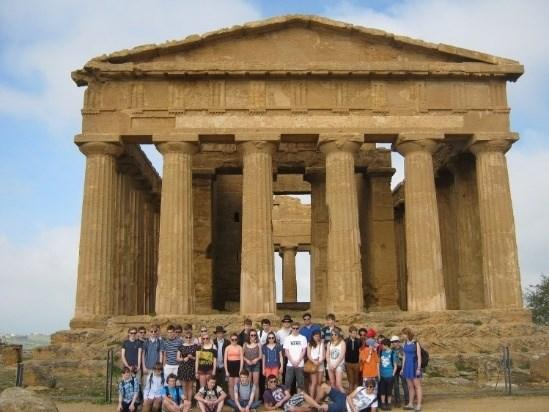
Over the course of the year, we study a range of different societies and civilisations from Ancient Mesopotamia to Augustan Rome. We begin with the most ancient societies after the first development of writing in 3000 BCE: Ancient Mesopotamia and Egypt. We then move to Greece and discuss the development of Athenian democracy, considering key social and political questions about this society and this revolutionary form of government. We then broaden our experience of ancient societies by comparing the experience of Athenians with the inhabitants of the brutal militaristic state of Sparta before then looking at Ancient China under the Qin Dynasty. Our final area of study is Ancient Rome: we begin with an introduction to the Roman world in general before delving into the more local history of Roman Britain, looking at how the Romans changed Britain in the first century CE, and how the Britons reacted to these changes, sometimes assimilating, sometimes fiercely resisting Roman occupation. In short, to study Ancient History in Year 9 is to develop an overview of the early development of world history, to build an understanding of what life was like in the ancient world, and to explore how Britain was occupied and governed by the Romans.
Anyone opting for this course can expect to undertake a range of different activities during the year, including preparing and giving presentations, researching and writing up projects, and of course reading and analysing primary sources. The key attribute pupils need to bring to the course is an interest in the ancient past.
We will spend time during the year becoming familiar with a range of ancient evidence as we seek to understand the classical world. We will look at texts (always in English translation) but also at archaeological evidence to help us piece together an impression of the ancient Greek and Roman worlds. Please note that there is no significant overlap between this course and Latin, Gratin or History in Year 9.
To find out more about what the subject involves, please do speak to one of the teachers in the Classics Department or Year 9s currently taking the subject.
Dr D MacLennan Head of Ancient History damaclennan@perse.co.uk

Video Presentation
Art & Design

This popular course will provide an essential grounding for those pupils interested in studying art at GCSE level and beyond, whilst building on previous foundation skills when dealing with shape, form, tone, texture, pattern, colour and composition. The increase in lesson time allows for more detailed practical and theoretical work in the studio.
Projects in Year 9 are designed to develop pupils’ understanding of visual literacy, creativity, problem solving skills and independent thinking. Students will learn to develop their own ways of recording the human form through examining proportion, drawing from life and observation. They will study how artists and designers have depicted the figure and how this links to the development of expression and identity and political thinking in contemporary society. They will learn how to question sources, develop their recording skills and explore their own ideas to develop a final outcome in 2D or 3D media, exploring digital collage and layering and printmaking / painting techniques in order to gain confidence to work independently mirroring a GCSE project.
Knowledge and understanding of art in our contemporary society and in other times and cultures is an integral part of the course and will relate directly to their practical investigations. Students will be expected to undertake academic research into contemporary and historical forms of Art to inform their own outcomes and will attend a trip in the Michaelmas term to study the Sainsbury Centre for Visual Arts collection at the UEA campus in Norwich.
By studying art in Year 9 pupils will learn how to think creatively and independently, exercise their problem-solving abilities and fine-tune skills such as hand-eye coordination and visual communication. In addition, they will learn how to become creative producers of their own content and viewpoints on the world rather than remaining passive consumers of other people’s work. A course in Art enhances pupil’s transferable skills of lateral thinking, complex analysis, and critical thinking.
Mr B Keeble Head of Art & Design bkeeble@Perse.co.uk
Video Presentation


Computer Science

Computer Science works in a similar way to the traditional sciences with a balance of theoretical concepts and practical activities. In Year 9, the theory topics covered include binary and hexadecimal, the internal structure of a PC, computer networking and file compression.
There will be plenty of practical work with six Python units, as well as physical computing with the microbit. Year 9 Computer Science will have significantly more lessons (5 per fortnight) than in Years 7 & 8 allowing for more practical time and development of a topic from lesson to lesson.
If you are considering taking the GCSE Computer Science course in Year 10, it is an expectation that you will choose Computer Science in Year 9. Even if you have not studied Computing before, you will find this course accessible as it recaps all the basics. If you are interested in programming, manipulating data, solving problems and discovering how computers work and communicate then you should find this course enjoyable and challenging.
Mr D Gwilt Head of Computer Science djgwilt@Perse.co.uk
Video Presentation

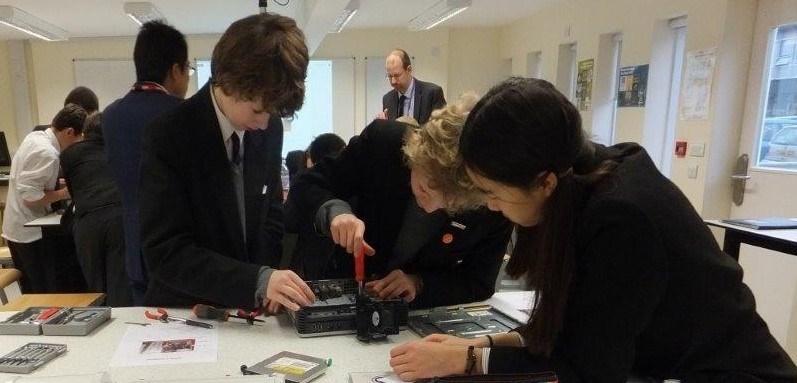
Design & Technology

Technology presents an exciting opportunity to engage in iterative design and build projects. You will learn how to make best use of hand tools, understand materials and techniques and become more proficient at computer-aided-design, utilising all the machines in the department to answer a wide variety of design briefs.
The main project is to design and make a light. Students follow a typical design process in detail and document their journey in a mini portfolio which looks like a more basic version of a GCSE project. The project will incorporate the many different elements of modern design and technology including 3D CAD, materials, Design and Systems. The great difference with year 9 DT compared with any previous DT is that there is more time for students to be creative and everyone will work to individual strengths and produce something different.
If pupils are considering taking the GCSE Design and Technology course in Year 10, it is an expectation that pupils will opt for Design and Technology in Year 9. It doesn’t matter if you have not done much Design and Technology before, this new course will start with the basics. Important criteria for maximum enjoyment include an interest in technical creativity, design and making.
Mr N Mainiero Head of Design & Technology
nmainiero@perse.co.uk
Video Presentation

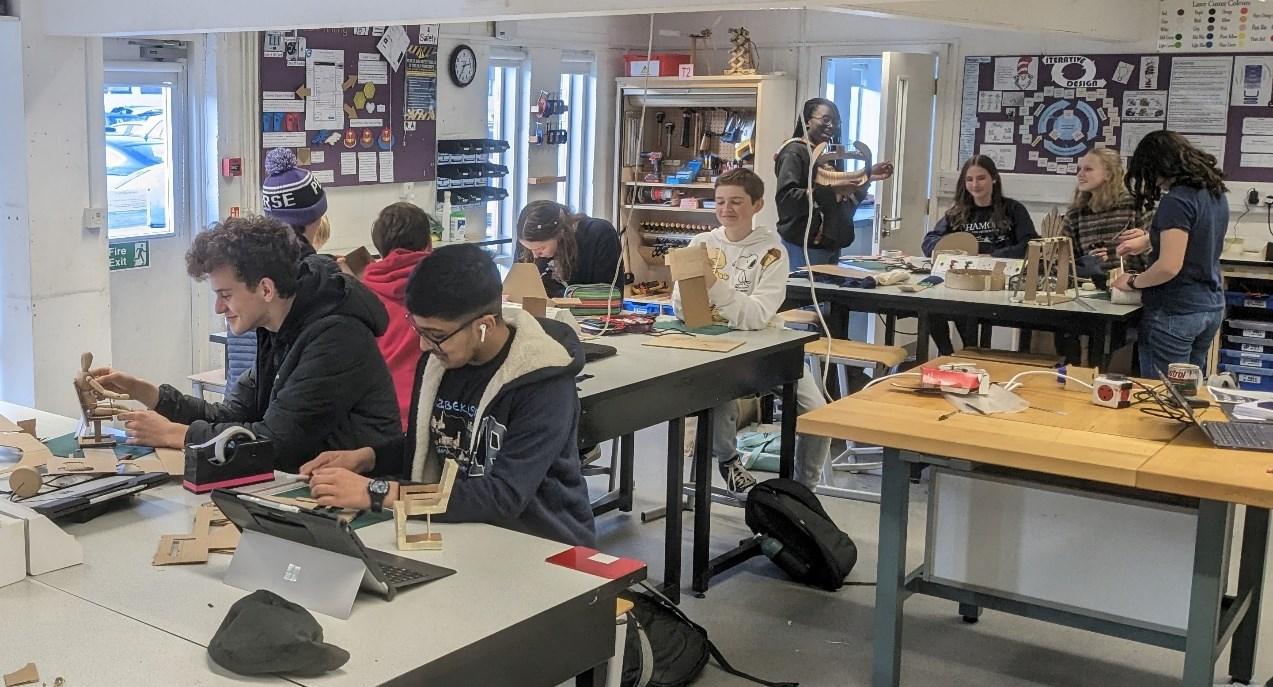
Drama
The Year 9 Drama course is a popular and successful option. The course builds on Drama skills acquired in earlier years and also offers an introduction to the subject for those who are new to it. Activities complement those carried out as part of the Year 9 English curriculum. The approach is a practical and enjoyable one, with the emphasis on learning through doing – but we are also keen to present a rigorous programme of activities which will enable students to pursue the subject at a higher level in a variety of later contexts (including the Year 10/11 Drama course and the Trinity, London options in Year 10 at The Perse).

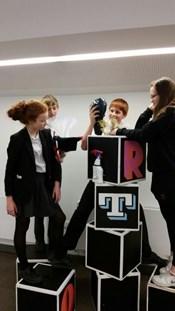
Students will improve their Drama skills by preparing existing texts for performance and by creating their own work. The course explores how a published text is animated and brought to life for an audience and also examines the key principles of devising a piece of Drama from stimulus materials. There are opportunities for whole-class work as well as pair and small group exploration. There are also opportunities to work in the roles of designer, deviser and director – as well as the chance to find out more about technical aspects of theatre performance. The course includes both an element of public performance and possible visits to professional performances in Cambridge and London. The course incorporates participation for all in the English-Speaking Union’s ‘Performing Shakespeare’ competition – and students have been highly successful in this event in recent years (sometimes progressing to the national final with a performance on stage in a West End theatre).
The course also begins to build Drama-related writing skills and includes both a written and practical assessment at the end of the year.
Please be aware that photographing and filming students for educational purposes is an integral part of this course.
Mr Chris Green Director of English & Drama cejgreen@Perse.co.uk
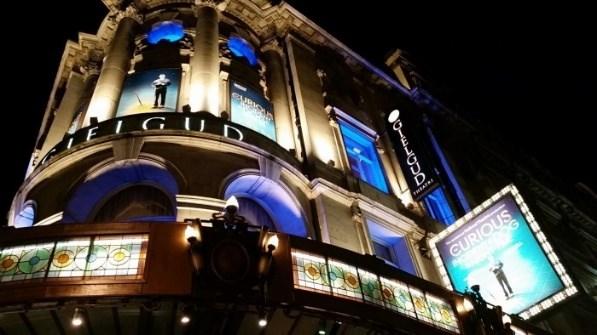
Video Presentation

Gratin (Greek & Latin)

Pupils taking the Year 9 Gratin course will study both Greek and Latin throughout the year. Pupils will use Book 1 of John Taylor's Greek to GCSE course and Book 2 of de Romanis. The pace of study is regulated to fit with the experience and ability of the group and the individuals within it, from beginners to those who have already studied some Greek (it is expected all students will have studied Latin beforehand). All pupils will have reached the same stage by the end of the year so that they are ready to embark upon the GCSE Gratin course, in Year 10.
The primary focus of the course is the study of both ancient languages. By the end of the year pupils will have developed a good understanding of Greek grammar and syntax while increasing their understanding of Latin. Those who have enjoyed learning Latin in Years 7 and 8 will find Greek to be a similar subject, with stories to translate into English and vocabulary to learn, while all the time they will be developing a better understanding of the ancient world. The Year 9 course forms the foundation from which the GCSE course continues in Years 10 and 11, and in almost every case it will be necessary for pupils opting for Gratin for GCSE to have studied the subject in Year 9. The GCSE course will culminate in the achievement of 2 separate GCSEs.
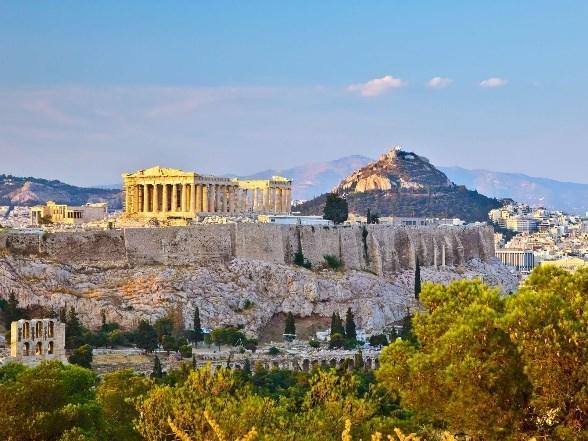
Anyone with particularly extensive prior experience of Greek should make contact with the Head of Classics in advance to discuss the best way to build on their previous learning. Pupils likely to thrive in this highly-regarded academic subject will have an aptitude for languages and are likely to have excelled in Latin. Given that two subjects are taught in one option block, the pace of this course is fast.
During the year pupils can expect to read stories about the adventures of Odysseus (including his encounter with the monstrous Cyclops) and Alexander the Great, as well as some of Aesop's famous fables. From a Latin perspective, Roman history is the focus, with pupils exploring from Rome’s mythical beginnings up to the reign of Augustus. There is no overlap between this course and Ancient History in Year 9. Gratin makes an excellent complement to this subject.
Mr S Foster Head of Classics sjfoster@Perse.co.uk
Video Presentation

Latin

Those who have enjoyed Latin in Years 7 and 8 will find that the subject continues in a familiar way in Year 9 as we make our way through Book 2 of de Romanis. We continue to read stories those in Year 9 being themed on episodes from Roman history as a means of learning about both how the language works and the wider Roman world. Along the way, students will build upon their grammatical understanding.
Although this subject is not suitable for beginners, those who have followed a different Latin course at their previous school normally become quickly integrated with those who continue from Year 8 at the Perse. If a pupil has covered considerably more or less Latin at their previous school than is covered in Book 1 of de Romanis (or Books 1 and 2 of the Cambridge Latin Course), however, it is recommended that they make contact in advance with the Head of Classics to discuss the best way to build upon their prior learning.
The Year 9 course provides an essential foundation for studying the subject at GCSE level, as many important language features and much key vocabulary is introduced and learned during the year. In almost every case, anyone who opts to study Latin in Year 10 will need to have completed the Year 9 course first.
During the year we will read stories that explore Rome’s mythical beginnings and its 7 kings, meeting certain famous Romans along the way, such as Cicero, Julius Caesar and Mark Antony. The course delves into aspects of the Roman military and Roman rule in Britain, as well as inspecting some of the wonderful narrative of the late Republic up to the reign of Augustus and his ensuing Principate. In addition, each chapter will explore a different theme that prompts lots of debate and discussion.
There is no overlap between this course and Ancient History in Year 9, in fact Latin makes an excellent complement to this subject.
Mr S Foster Head of Classics sjfoster@Perse.co.uk

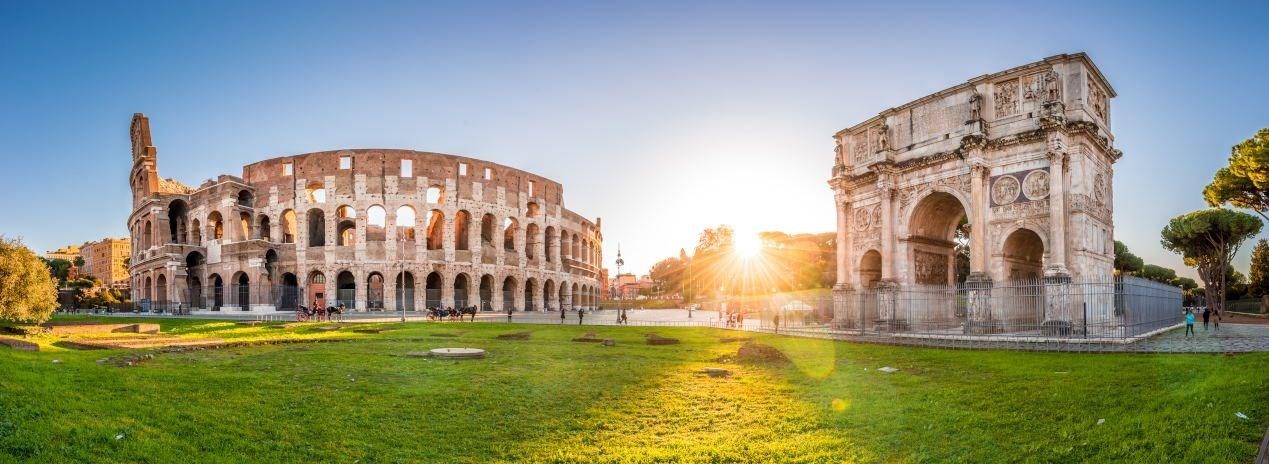
Video Presentation
Modern Foreign Languages

All pupils should study at least one modern foreign language to GCSE. We encourage students to study two languages in Year 9 in order to have a genuine choice for GCSE. Many pupils will continue to study two languages for GCSE, while some linguist enthusiasts will even continue with three languages.
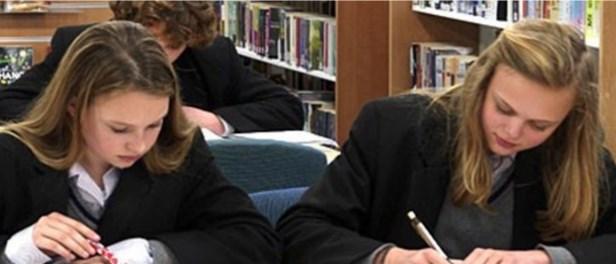
In addition to French and Spanish, German and Mandarin are also offered as curriculum choices. Please note that Mandarin can only be chosen in combination with another modern foreign language. An ab initio course in Spanish may be offered if there is sufficient demand. Please note that there is no ab initio course in French.
Each course is designed to introduce pupils to the basics of the language and to provide a firm foundation of grammar and vocabulary to be developed further in Years 10 and 11. Themes and activities set in realistic contexts and using authentic documents encourage students to understand, speak, read and write the language with confidence. Practical topic areas include: Personal details, Family, Hobbies and Sport, Travel, Food and Drink.
The course books and materials that we use have been chosen to give pupils insight into aspects of life and culture in those countries where the chosen language is spoken. The courses are for those who enjoy languages in themselves, as well as for those who see languages as an advantageous CV enhancer for future employment. Pupils will also have regular opportunities to develop their language skills by making full use of our ICT language-learning subscriptions.
Extra-curricular GCSE languages
• Italian (2-year beginners' course)
• Japanese (3-year beginners' course)
• Mandarin (2-year intermediate course, not suitable for beginners)
The Perse offers pupils the chance to study an additional MFL to GCSE in extra- curricular sessions. These take place over one lunchtime and one after-school session per week, a total of 2 hours 15 minutes tuition weekly. The aim is to reach 8/9 standard at GCSE within the allocated course duration. There is an annual financial contribution involved with this subsidised extra-curricular provision. It should be noted that the extra-curricular programme does not act as a substitute for the French/German/Mandarin/Spanish curriculum options. In offering the extra-curricular language choices, we provide a broader range of subjects for those who wish to enrich further their language-learning experience
Modern Foreign Languages
French and Spanish continuers to GCSE

Pupils will work on the topics and grammar of the AQA GCSE course building on the knowledge of grammar and vocabulary they have acquired in Years 7 and 8. The range of topics covered will be varied with greater emphasis on grammatical accuracy.
Pupils will have the opportunity to practise their spoken language at regular intervals and the emphasis is divided equally between the four skills of listening, speaking, reading and writing. In Years 10 and 11, oral lessons are taken with a native speaker, which provides an excellent opportunity to develop the spoken language.
German continuers (second year of learning) to GCSE
Having had a weekly introduction to German in Year 8, pupils can opt to continue with German in Year 9. We revisit and build on the introduction to high frequency language covered in Year 8 so that pupils feel able use and understand a wide range of tenses, idioms and themed vocabulary by the end of Year 9. Every two years we run a residential trip to Cologne for pupils in Years 9 and 10, which is an excellent way to experience the culture and language introduced in the classroom.
Pupils joining the school in Year 9 will follow the same course as those pupils who experienced the beginners classes in Year 8. The accelerated linguistic coverage prepares pupils for the GCSE examination at the end of Year 11.
Mandarin beginners to GCSE
In year 9, pupils are introduced to Mandarin as beginners, first learning the pronunciation rules and how to read Pinyin, and then analysing character composition. This course offers a communicative approach to learning, with a focus on spontaneous speaking through role plays, speaking games and an opportunity to work in small groups once a week with a native speaker. Word order will be the main grammatical focus in the first year of study. Students will cover the topics of Family & Friends, Food & Festivals, and School. We recommend that students choose the subject if they have an interest in learning about a distinct culture and language and want a challenge!
In order to allow a genuine choice for GCSE at the end of Year 9, pupils opting for the Mandarin beginners’ course are required to continue with the study of a core language studied previously (French or Spanish) alongside Mandarin during Year 9.
Modern Foreign Languages
For the attention of native speakers of French, German, Spanish or Mandarin

In order to maximise their academic profile, native speakers are advised to select a different language from their mother tongue for their Year 9 (as well as Years 10 and 11) curriculum language options. Many bilingual students choose to enter privately for earlier examination in their native language (GCSE, A Level, International certificates) and parents should seek advice about how to register for these from exams team at myexamforms@perse.co.uk and from the Head of the language (or Miss Bolton for languages not studied within the curriculum). Please note that we cannot provide private preparation for students, although we are always happy to suggest resources for external tutors to use.
Where there is capacity in the department, we would aim to support bilingual students with more advanced practice of their native tongue in extension sessions.
Dr M Ellison
Head of French msellison@Perse.co.uk
Mr D Brunskill
Head of German dabrunskill@Perse.co.uk
Miss K Nugent
Head of Spanish kemnugent@Perse.co.uk
Miss H Bolton
Head of Mandarin hebolton@Perse.co.uk
Video Presentation

Music

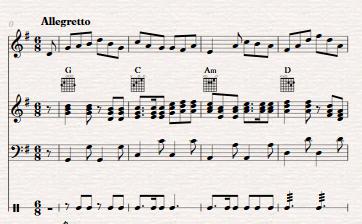
Music in Year 9 builds on the skills acquired during Years 7 and 8, enabling pupils to further their listening, performing and composing techniques. It is an engaging and varied course with topics such as song-writing, the Classical minuet, reggae and minimalism.
A number of composition and performance projects will arise from these topics and all pupils will receive a thorough introduction to the notation program, Sibelius and also Soundtrap, an online sequencing program. Pupils may also be able to make use of the recording facilities in the music department.
The skills learnt in year 9 form an essential grounding for the GCSE course so it is strongly recommended that pupils intending to take GCSE opt for music in Year 9. If pupils are considering taking the extra-curricular option in Year 10, it is an expectation that pupils will opt for music in Year 9.
Year 9 music is an all-inclusive course and no pupil need feel that lack of experience as an instrumentalist should bar them from choosing this subject.
Ms K Pledger Head of Curricular Music kpledger@Perse.co.uk
Video Presentation

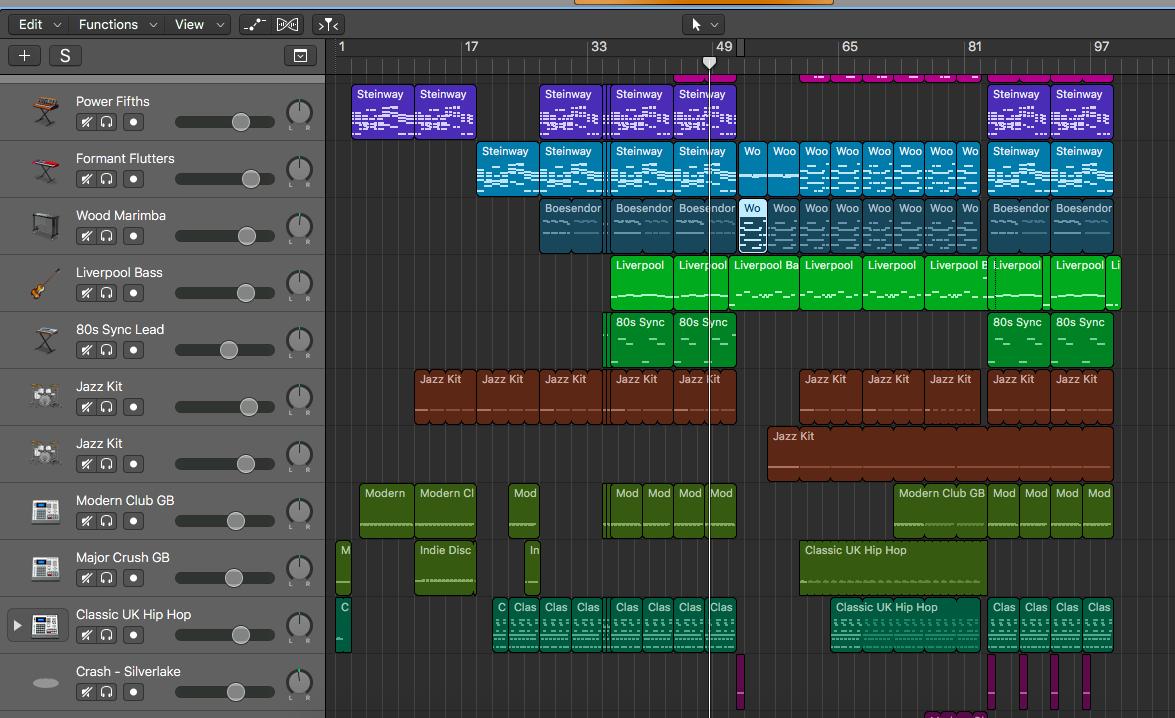
Aristotelian Award for Research

Year 9 students may choose to take part in the Aristotelian Award: a national Year 9 research essay competition run by the Perse Research Prefects. Unlike the PPQ in Year 8 where students can choose their own title from any topic they want, Year 9 students have a choice of 10 titles split into 2 categories: Arts/Humanities and Sciences. In 2023-2024 the titles were:
Arts/Humanities
Which aspects of physical geography have the strongest effects on the economic growth and/or output of a country?
Is ‘sportswashing’ a significant issue for international sport?
To what extent are governments now prepared for future pandemics?
Email or snail mail: Do paper-based documents have a future in the twenty first century?
Select a cultural advance from the ancient world and discuss why it is still relevant today. (For example, you might consider writing systems, social change, religious or political practice or artistic developments – or anything else which you can think of!)
Science
To what extent can we regard nuclear fusion as the solution to the world’s energy crisis?
“Businesses who do not use AI in the workplace will fall dramatically behind those who do.” Discuss.
How effective is carbon capture as a method of reducing climate change?
Why are some medicines more expensive than others?
Some people would say that Einstein is the most deserving winner of the Nobel Prize for a science. To what extent do you agree?
The essay should be no longer than 1500 words and have a bibliography of at least 5 sources. The competition encourages students to discuss both sides of the argument critically, have logical and coherent arguments and draw a conclusion. The winner of each category receives £70, whilst there are four Highly Commended entries in each category worth £20. The usual timeline for the competition is from the start of October to the end of January. Results are published by Easter, with a certificate and some overall feedback. We hope that the competition provides students both within The Perse (and in other schools) the opportunity to develop their research skills before engaging with more formal opportunities at GCSE (HPQ) and A Level (EPQ or Rouse). For more information you can visit the Perse Research website: Year 9 - Aristotelian Award - Perse Research.
Middle School Digital Device Scheme

All Year 9 students are issued, by the school, with a Microsoft Surface Pro device to assist with their learning during Middle School at the start of the year. This ensures that all students have access to an appropriate lightweight device with a type-case keyboard, excellent digital inking, good battery life and, very importantly, a rubber-fitting case which is essential for day-to-day school use and must not be removed under the insurance scheme.

This device is subject to a regular usage charge, payments for which are taken on a termly basis over three years. This allows us to provide a repair provision for the main device and keyboard builtin1 which extends over the full three years (NB: the repair service does not include the pen or charger which is under a standard 1 year warranty).
During this period, the device is still owned and fully managed by the school by way of installed software and web filtering (with tighter filtering and teacher-view/lock control active during the school day when on site). This active-management is essential for the smooth running of devices and classrooms so students do have to use the school-issued device on site and are not permitted to install their own software.
At the end of the three-year period, the device is retained by the student (ownership transfers to the parent/carer) and the school management software layer is fully removed at that point with no additional charge. Often students then choose to continue use of the device as part of the Sixth Form BYOD scheme for at least one more year.
More information can be found on the dedicated page in the Upper Parent Handbook2 .
1 The excess charge for repair of the main device is set at £150 to keep the scheme more affordable.
2 Please note that this link to the Parent Portal will not work for parents of external joiners until after the Easter holiday.















